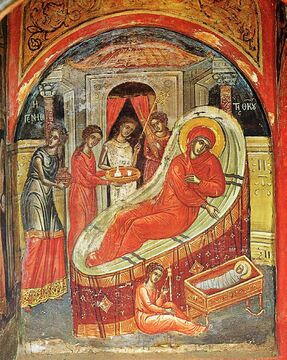 The Church year begins with the Mother of God, her Nativity, and ends with the Mother of God, her Dormition. At Vespers, we heard a beautiful hymn: “Today is the beginning of joy for all the world; today the winds blow that bring tidings of salvation. The barrenness of our nature has been loosed: for the barren woman is revealed as mother of her who, after bearing the Maker, still remained Virgin.” Through the Mother of God, the barrenness of human nature – for God long awaited some fruit from mankind, as from the fig tree (cf. Mark 11.12-20) – is loosed.
The Church year begins with the Mother of God, her Nativity, and ends with the Mother of God, her Dormition. At Vespers, we heard a beautiful hymn: “Today is the beginning of joy for all the world; today the winds blow that bring tidings of salvation. The barrenness of our nature has been loosed: for the barren woman is revealed as mother of her who, after bearing the Maker, still remained Virgin.” Through the Mother of God, the barrenness of human nature – for God long awaited some fruit from mankind, as from the fig tree (cf. Mark 11.12-20) – is loosed.
Before, there existed honorable people, glory to God. But she who is truly worthy of God appears barely now. Now appears she who God had in mind when He created the human nature. The Mother of God is humanity’s sweetest fruit. And after her, the “barrenness of our nature” was healed, because many saints came after her. If in the Old Testament, saints and righteous men appeared intermittently, then after the Incarnation, they gushed forth.
Through the Mother of God, our Lord came into the world. And when man’s effort is united with God’s effort, then everything is settled. But God could not act in full capacity until there arose a pure and honorable vessel in which He could abide. And starting from her, He then cleansed many dishonorable vessels, like us, and some were also sanctified; from harlots, He created saints and martyrs.
In this hymn, the hymnographer makes use of Saint Anna’s barrenness, as one who was infertile and already elderly, to highlight the barrenness of human nature, which could not bear any fruit worthy of God. This evokes the beautiful image that by loosening Saint Anna’s barrenness, which was loosened by giving birth to the Mother of God, the whole world is loosened of its barrenness, of its unfruitfulness, upon the appearance of the Mother of God, our greatest fruit. By her, all the nations were blessed because through the One Born of her, sainthood was made universal. Now, sanctity is accessible to anyone who desires it. No one’s background or heritage is so poor or difficult that he or she cannot be sanctified, transformed into an abode of the Holy Spirit. And all this is thanks to the Theotokos.
Several years before Elder Arsenie Papacioc’s death, several fathers from Putna paid him a visit at Techirghiol. Father Abbot Melchisedec brought him an icon of the Mother of God, which Father Arsenie kissed with reverence, saying, “Mother of God, don’t abandon me!” He said this prayer very naturally and spontaneously. We all know how necessary this prayer is for us. Thankfully, the Mother of God doesn’t abandon us because she is good and kind-hearted. But we need to cling to this prayer several times per day, or else we’ll perish. And she helps us not only not to perish, but also to bear fruit in God, such that the words of the hymn – “today, the barrenness of our nature has been loosed” – may be fulfilled even in us.
